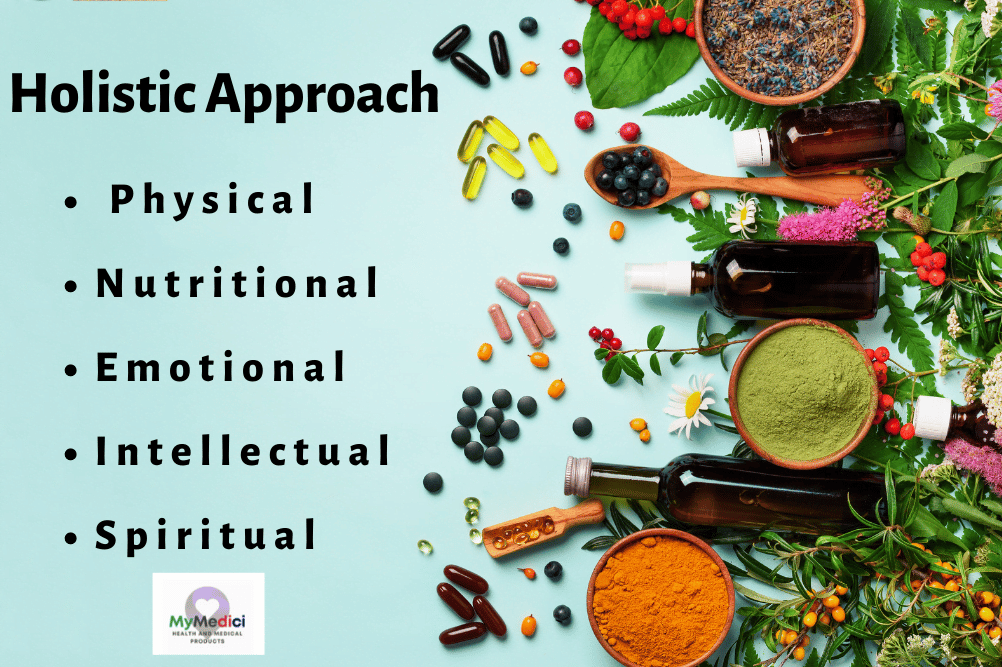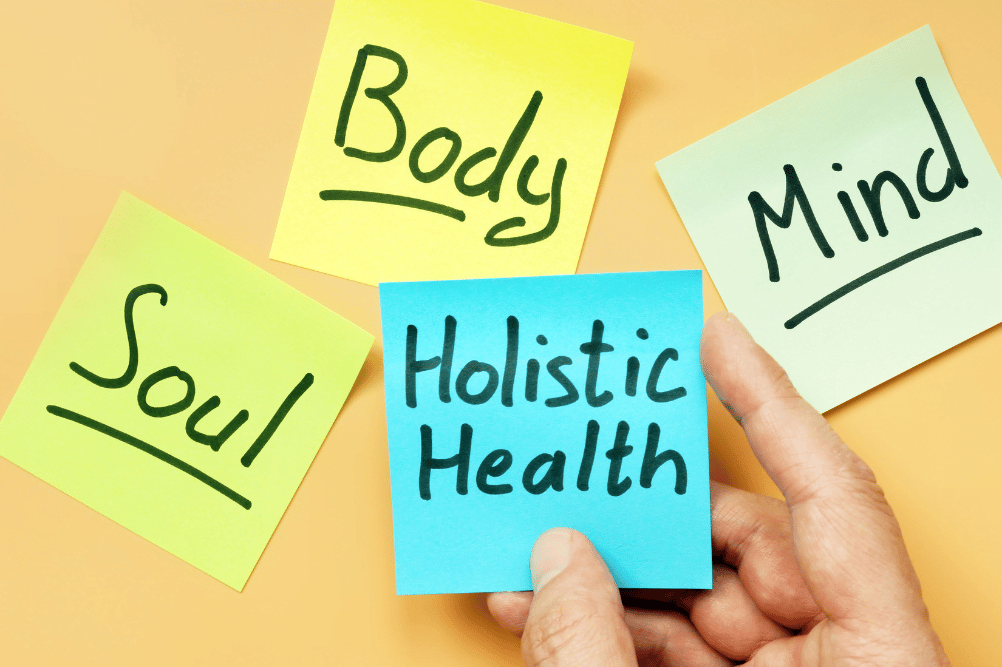Taking care of your body and your overall wellness involves numerous layers that look after the whole person and not just the physical attributes of looking fit and being in shape. This article is going to be taking a look at the holistic approach to taking care of your body and your health, what it means and what you can actively do. Ultimately, a holistic approach to health and wellness will see you improve on every level.
What Does a Holistic Approach Actually Mean?
The definition was alluded to in the introduction. While your goal might be to get into shape, eat well, exercise and basically look good in a physical sense, approaching this goal holistically essentially means you’ll be breaking things down into 5 common areas:
- Physical
- Nutritional
- Emotional
- Intellectual
- Spiritual
You could technically add more to this list but when it comes to focusing on doing everything you can to improve your physical well-being, these 5 factors all play a role. All 5 can impact the physical being in some form or another, so if you really want to do the very best for your body, then working on all 5 facets of holistic wellness is necessary to achieve optimum results.
Rather than focusing on things like illness or using pharmaceuticals to try and promote wellness and health, a holistic lifestyle is primarily based on doing things the natural way and it’s all-encompassing.
Let’s now break these 5 important components down into more detail.
The Holistic Approach: Exploring the Five Components
Physical: Exercise & Activity
Regular physical exercise and activity play a pivotal role in achieving holistic health. However, physical well-being goes beyond exercise alone. Adequate and restful sleep is essential for maintaining a healthy body. To improve your sleep quality, consider avoiding screens before bedtime, creating a dark and quiet bedroom environment, or incorporating relaxation music and essential oils.
Other factors that directly impact physical health include maintaining a balanced diet, which will be further discussed in the next section, and practising good personal hygiene to prevent illness and disease.

Nutritional: Feeding Your Body Right
Having a fit and healthy body is impossible without providing it with the right nutrients. Good nutrition is as crucial as physical exercise in achieving overall well-being. Maintaining a balanced diet that is low in sweets and junk food while incorporating essential dietary needs is essential for physical well-being.
Your body requires protein for muscle strength and growth, carbohydrates for energy, a variety of fruits and vegetables for vitamins and nutrients, healthy oils for brain function and joint health, and an ample amount of fresh water. While it is best to obtain these nutrients from food, supplements can be considered if you struggle to meet your daily requirements.
Emotional: The Link Between Emotions and Physical Health
A person’s emotional state can significantly impact their physical well-being. Stress, worry, sadness, and depression can all affect your physical health. Therefore, maintaining emotional health is just as essential as other aspects of holistic wellness.
To support emotional well-being, make a conscious effort to control your thoughts, as negative thoughts can lead to bad feelings. Take time to assess and process your emotions, preventing them from becoming overwhelming and affecting various aspects of your life.

Intellectual
Moods and your intellect can often go hand in hand and doing things to sharpen your mind and your thinking patterns will, in turn, improve your moods and improve your physical wellbeing as a result.
Engaging your brain in things like puzzles can help keep you sharp. Anything that your mind finds engaging and gets you thinking is going to be good for your intellectual health. You could even opt to complete a course and learn something new for added stimulation. Reading is one of the best things you can do to exercise that brain muscles, as is writing.
Spiritual
Now we arrive at the spiritual pillar of a holistic approach to health and wellness for the body. This is a more personal pillar but one that certainly has an impact on someone’s well-being.
Spirituality in this instance isn’t referring to believing in a deity or going to church on Sundays. Instead, it’s more about spirituality within one’s self, spirituality in the physical realm. It’s about having meaning in your life, a sense of purpose, direction and fulfilment. Ultimately, it’s all about creating a harmonious balance of everything that an individual feels is important.
You can improve your spiritual state through active mindfulness, engaging in meditation and yoga, having quiet time each day to reflect without distractions and possibly even writing things down in a journal.
Anything you can do that helps you tune into yourself, your values, your goals and your ideals will help spiritual growth and in turn, feeling positive spiritually also has a positive impact on the physical being and health and wellness.
Dedicate some time each day to nurturing your spirit, whether it be connecting with nature or whatever works for you.
The Takeaway
If your goal is to achieve ultimate physical fitness and health, it is essential to target the five pillars of holistic health discussed in this article. By paying attention to each area—physical, nutritional, emotional, intellectual, and spiritual—you can experience the cumulative effect of total health and well-being. Embrace a holistic approach to taking care of your body and prioritize each of these aspects to reap the benefits they offer. Remember that the interconnectedness of these components is what makes the holistic approach so powerful. By addressing all five areas, you can achieve a state of total health and well-being.
Incorporate regular physical exercise and activity into your routine to promote physical fitness. However, don’t overlook the importance of quality sleep, as it directly impacts your physical well-being. Establish a bedtime routine that promotes restful sleep, such as avoiding screens before bed, creating a serene sleep environment, or incorporating relaxation techniques.
When it comes to nutrition, focus on maintaining a balanced diet that provides your body with essential nutrients. Consume a variety of fruits, vegetables, lean proteins, whole grains, and healthy fats. Hydration is also crucial, so ensure you drink plenty of water throughout the day. If you find it challenging to meet your nutritional needs through diet alone, consider incorporating multivitamins or targeted supplements to bridge any gaps.

Emotional health plays a significant role in physical well-being. Take the time to assess your emotions, process them, and develop healthy coping mechanisms. Engage in activities that bring you joy and help you relax. Practice mindfulness and stress-management techniques to foster emotional balance.
To nurture your intellectual health, keep your mind active and engaged. Challenge yourself with puzzles, pursue hobbies that stimulate your thinking, and consider furthering your knowledge through courses or reading. By continuously learning and expanding your intellectual horizons, you can improve your overall mood and well-being.
Finally, spiritual well-being is about finding inner balance and meaning in your life. It’s a deeply personal aspect that involves connecting with your values, beliefs, and goals. Engage in practices such as meditation, yoga, or spending time in nature to cultivate a sense of spirituality. Reflect on what brings you fulfilment and purpose, and incorporate those elements into your daily life.

By dedicating time and attention to each of these five components, you will create a harmonious balance that promotes total health and well-being. Remember that the journey towards holistic health is ongoing, and it requires a commitment to self-care and self-discovery. Embrace the holistic approach and experience the transformative effects it can have on your body, mind, and spirit.
Sources:
The 8 Pillars of Holistic Health and Wellness
What is Holistic Health








